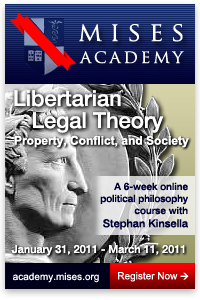“Intellectual Freedom and Learning Versus Patent and Copyright,” Economic Notes No. 113 (Libertarian Alliance, Jan. 18, 2011)
- also published as “Intellectual Freedom and Learning Versus Patent and Copyright,” The Libertarian Standard, Jan. 19, 2011
Related Mises.org post; archived comments below:
Kinsella: “Intellectual Freedom and Learning Versus Patent and Copyright”
My article, “Intellectual Freedom and Learning Versus Patent and Copyright,” was published today in Economic Notes (No. 113, Jan. 18, 2011), a publication of the UK-based Libertarian Alliance. (This article is based on my speech of Nov. 6, 2010, at the 2010 Students for Liberty Texas Regional Conference, University of Texas, Austin; audio and video versions may be found here; see also below.)
 In my various publications and speeches about intellectual property (IP), I’ve approached it from a variety of angles. In this article, I consider the role of information and learning, and the role of property rights, in human action. I use a praxeological analysis to argue that human action employs scarce resources or means, but that action is guided by non-scarce ideas and knowledge.1 Property rights are recognized in means because they are scarce; but ideas are not scarce things: they are infinitely reproducible. The growing body of knowledge is a boon to mankind. Property rights is needed for scarce means so that they can be peacefully and productively used in action; property rights in ideas restricts, impairs, and impedes learning and the use of information to guide one’s actions. Copying information and ideas is not stealing. Learning is not stealing. Using information is not trespass. In this article, I urge young libertarians to stay on the vanguard of intellectual freedom, and to fight the shackles of patent and copyright.
In my various publications and speeches about intellectual property (IP), I’ve approached it from a variety of angles. In this article, I consider the role of information and learning, and the role of property rights, in human action. I use a praxeological analysis to argue that human action employs scarce resources or means, but that action is guided by non-scarce ideas and knowledge.1 Property rights are recognized in means because they are scarce; but ideas are not scarce things: they are infinitely reproducible. The growing body of knowledge is a boon to mankind. Property rights is needed for scarce means so that they can be peacefully and productively used in action; property rights in ideas restricts, impairs, and impedes learning and the use of information to guide one’s actions. Copying information and ideas is not stealing. Learning is not stealing. Using information is not trespass. In this article, I urge young libertarians to stay on the vanguard of intellectual freedom, and to fight the shackles of patent and copyright.
Incidentally, my 6-week Mises Academy course “Libertarian Legal Theory: Property, Conflict, and Society” starts at the end of this month (Jan. 31-Mar. 11, 2011). I describe it in my article “Introduction to Libertarian Legal Theory,” Mises Daily (Jan. 3, 2011).
 Â January 18, 2011 at 1:16 pm
 January 18, 2011 at 1:16 pm-
I wonder how long it will take Silas to make his usual assinine statements. We know he won’t bother actually reading this paper.
 Â January 18, 2011 at 4:00 pm
 January 18, 2011 at 4:00 pm-
Aww, I think I learn as much from the arguments with Silas as from the articles themselves….
 Â January 19, 2011 at 3:28 pm
 January 19, 2011 at 3:28 pm-
Yeah, I’d say two things have formed the largest parts of my current thinking on IP:
1) Kinsella’s book, articles, blog posts, etc.
2) Peter Surda’s responses to Silas.
 Â January 19, 2011 at 1:30 am
 January 19, 2011 at 1:30 am-
Sad!
 Â January 19, 2011 at 8:00 am
 January 19, 2011 at 8:00 am-
hmm as an objectivist he has to obey the wish of mises.org. Remember: IP dictates everything.
But I agree with others here: If someone that eager to spread the objectivist word is “banned” he will try and find a way to get back. Therefore it would be better imho to let him back here under his “real” name.
 Â January 19, 2011 at 8:59 am
 January 19, 2011 at 8:59 am-
It is amusing when I debate this issue, economists who deal with scarce resources are always concerned with increasing the supply to increase production and reduce production costs. Yet, when they deal with IP, non-scarce resources, they are constantly attempting to reduce the supply and by doing so reduce the production based on the supply and increase the cost. Seems kind of “non-economic” to me.
It simply makes no sense to me. It is like stimulating the economy by rationing air.
 Â January 20, 2011 at 1:59 pm
 January 20, 2011 at 1:59 pm-
hehe spot on.
- Ideas are Free: The Case Against Intellectual Property: or, How Libertarians Went Wrong; Stephan Kinsella, “Intellectual Property and the Structure of Human Action,” StephanKinsella.com (Jan. 6, 2010); idem, “Law and Intellectual Property in a Stateless Society,” in Legal Foundations of a Free Society (Houston, Texas: Papinian Press, 2023), Part III.D;  idem, “Against Intellectual Property After Twenty Years,” in Legal Foundations of a Free Society, Part IV.E. [↩]




{ 13 comments… read them below or add one }